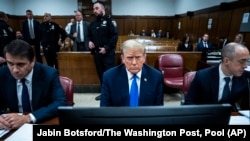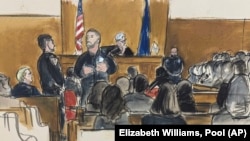A 12-member jury was seated Thursday in the New York hush money trial of Donald Trump, the first criminal case brought against a former U.S. president.
Seven men and five women were picked to consider allegations that the 45th president schemed in 2016 — just ahead of his successful White House campaign — to hide hush money payments to two women to cover up their claims of alleged extramarital affairs with him.
Prosecutors contend that Trump was seeking to keep compromising information about his private life from voters just before they cast ballots eight years ago.
But Trump, who was president from 2017 to 2021 and is the presumptive Republican presidential nominee in the November 5 election, has denied the affairs and all 34 felony counts in the indictment filed against him a year ago.
If convicted, he could be imprisoned for up to four years.
New York Supreme Court Justice Juan Merchan said opening arguments in the case could start Monday morning in a trial that could last six weeks.
Merchan, prosecutors and Trump defense lawyers spent hours over three days this week asking prospective jurors their views of Trump.
When the 12th juror was picked, Merchan declared, "We have our jury."
The judge and the lawyers quizzed the jurors about how they consumed news of the day, where they worked,and specifically, whether they could fairly judge the 77-year-old Trump, a New York celebrity and real estate magnate for years before entering politics in 2015.
Dozens of would-be jurors, their names drawn from voter registration lists in the heavily Democratic city that resoundingly voted against Trump in his 2016 and 2020 campaigns, immediately told Merchan they could not render an unbiased verdict and were dismissed.
Merchan dismissed some possible jurors whom he felt, based on their answers in court or social media posts denigrating Trump, could not fairly judge the case.
Both the prosecutors and Trump's lawyers had 10 available peremptory challenges they could use to keep jurors they did not like off the jury.
The 10-challenge rule came into play at the end of jury selection, to Trump's detriment.
When one potential juror was asked how she felt about Trump, said she did not have strong opinions about him, but added, "I don't like his persona, how he presents himself in public."
She then said, "I don't like some of my coworkers, but I don't try to sabotage their work."
Trump's lawyers tried to keep her off the jury, challenging her selection "for cause," but Merchan denied their challenge.
By that point, Trump's lawyers were out of peremptory challenges, and she is on the jury, which has been sworn in by Merchan.
Seven jurors had been selected by the close of Tuesday's proceedings, but two were excluded from the case on Thursday. One, an oncology nurse, told Merchan her friends told her she had been all but identified because of what "has been reported about her publicly."
Merchan excused her from the jury, while demanding that the media limit its reporting of would-be jurors' employment and what they look like.
In a second case, a man identified only as Juror No. 4, was removed without public explanation after prosecutors told Merchan he may have given deceptive answers about his background when he was questioned earlier in the week.
Prosecutors and Trump's lawyers huddled in front of Merchan for an out-of-earshot discussion with the juror before Merchan dismissed him.
After several more hours of questioning on Thursday, another seven jurors were selected along with one of up to six alternates. Merchan said he could pick another five alternates on Friday.
The alternates will hear testimony in the case but will only participate in deciding the case if one of the 12 jurors is incapacitated or otherwise dismissed for some reason.
Although the names of the would-be jurors have not been made public to protect their identity and safety, the lawyers had a list of them. Trump's support staff pored over the names to see what anti-Trump social media messages they might have posted in recent years.
Trump has often assailed Merchan in his social media posts and called the case "election interference" as he seeks to reclaim the presidency.
Prosecutors have contended that Trump several times has violated Merchan's gag order prohibiting him from disparaging key participants in the case, although the judge excluded himself from the edict.
Merchan has scheduled a hearing next week to hear arguments on the prosecutors' demand that Trump be held in contempt of court and fined, although Trump has denied any wrongdoing.
The former president has watched the proceedings from the defendant's table flanked by his lawyers, taking some notes and occasionally glancing at the prospective jurors. He appeared to doze off at some points on Monday and Tuesday before jolting alert again.
Eventually, he could take the witness stand to defend himself, depending on how he and his lawyers view the prosecutors' evidence.
Since Trump is required to be in court, the case almost certainly will limit his time on the campaign trail.
The charges against Trump
Trump stands accused of hiding a $130,000 hush money payment to porn actress Stormy Daniels just ahead of the 2016 election to keep her from publicly talking about her claim that she had a one-night tryst with him at a celebrity golf tournament a decade earlier, less than four months after Trump's wife, Melania, had given birth to Barron, the couple's son, who is now 18.
In a second instance, the indictment alleges that a former Playboy Playmate of the Year, Karen McDougal, says she had a monthslong affair with Trump and was paid $150,000 by a tabloid publisher who bought the rights to her story and then, at Trump's urging, killed the article.
Trump has denied both affairs and all 34 charges he faces in the New York case, including that he directed his one-time political fixer, convicted perjurer Michael Cohen, to make the payment to Daniels and then reimbursed him during the first year of his presidency in 2017 — all the while labeling the monthly stipends to Cohen in Trump's business records as legal expenses.
As he arrived for the trial on Tuesday, Trump told reporters, "I was paying a lawyer and marked it down as a legal expense. That's exactly what it was."
Altering his company's ledgers would be a misdemeanor offense, but to convict Trump of a more serious felony, prosecutors will have to convince jurors he committed an underlying crime, such as trying to influence the outcome of the 2016 election by keeping information about the alleged affairs from voters.
It is not illegal to pay hush money, and Trump may claim the payments were made simply to avoid disclosure of personally compromising moments of his life, not to try to influence the 2016 election.
The 12-member jury will have to reach a unanimous decision of either a guilty verdict or acquittal. If the jurors fail to agree among themselves, there would be what is called a "hung jury," leaving the prosecutors to decide whether to seek a new trial.
Each of the charges carries the possibility of a four-year prison term, although Trump is certain to appeal any guilty verdict and sentence.
The New York case is one of an unprecedented four criminal indictments Trump is facing encompassing 88 charges, all of which he has denied.
Two of the other indictments — one state and one federal — accuse him of illegally trying to upend his 2020 loss, while the third alleges he illegally took hundreds of highly classified national security documents with him to his oceanside Florida estate when his presidential term ended, and then refused requests by investigators to return them.
No firm trial dates have been set in any of those three cases, and Trump has sought to push the start dates until after the election
If he wins, he could seek to have the federal charges dismissed. In any event, if he assumes power again, he would not be tried during his presidency.





